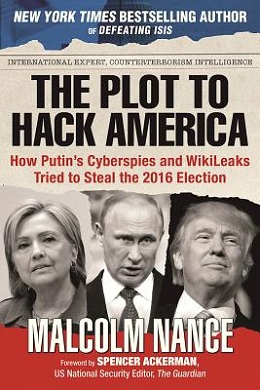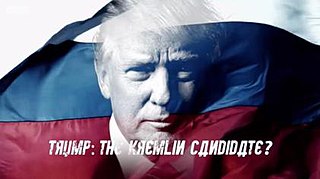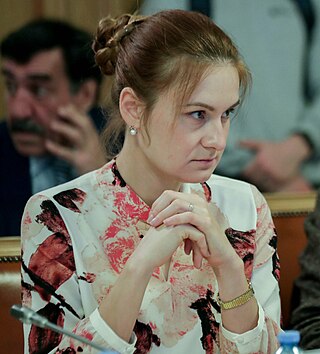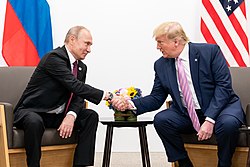
David Corn is an American political journalist and author. He is the Washington, D.C. bureau chief for Mother Jones and is best known as a cable television commentator. Corn worked at The Nation from 1987 to 2007, where he served as Washington editor.

Michael Isikoff is an American investigative journalist who is currently the Chief Investigative Correspondent at Yahoo! News. He is the co-author with David Corn of the book titled Russian Roulette: The Inside Story of Putin's War on America and the Election of Donald Trump, published on March 13, 2018.
Russian roulette is a potentially lethal game of chance played with a revolver.

Russia and the United States maintain one of the most important, critical and strategic foreign relations in the world. Both nations have shared interests in nuclear safety and security, nonproliferation, counterterrorism, and space exploration.

Dimitri Konstantinovich Simes is a Russian-American author, editor, and political pundit. He is the former president and CEO of The Center for the National Interest, where he served from 1994 to 2022. Simes was selected to lead the Center by former President Richard Nixon, to whom he served as an informal foreign policy advisor and with whom he traveled regularly to Russia and other former Soviet states as well as Western and Central Europe.

The Russian government interfered in the 2016 U.S. presidential election with the goals of harming the campaign of Hillary Clinton, boosting the candidacy of Donald Trump, and increasing political and social discord in the United States. According to the U.S. intelligence community, the operation—code named Project Lakhta—was ordered directly by Russian president Vladimir Putin. The Special Counsel's report, made public in April 2019, examined numerous contacts between the Trump campaign and Russian officials but concluded that there was insufficient evidence to bring any conspiracy or coordination charges against Trump or his associates.

The Steele dossier, also known as the Trump–Russia dossier, is a controversial political opposition research report written from June to December 2016, containing allegations of misconduct, conspiracy, and cooperation between Donald Trump's presidential campaign and the government of Russia prior to and during the 2016 election campaign. Several key allegations made in June 2016 were later corroborated by the January 2017 report by the Office of the Director of National Intelligence, namely that Vladimir Putin favored Trump over Hillary Clinton; that he personally ordered an "influence campaign" to harm Clinton's campaign and to "undermine public faith in the US democratic process"; that he ordered cyberattacks on both parties; and that many Trump campaign officials and associates had numerous secretive contacts with Russian agents. While Steele's documents played a significant role in initially highlighting the general friendliness between Trump and the Putin administration, the veracity of specific allegations is highly variable. Some have been publicly confirmed, others are plausible but not specifically confirmed, and some are dubious in retrospect but not strictly disproven.

Donald Trump has pursued business deals in Russia since 1987, and has repeatedly traveled there to explore potential business opportunities. In 1996, Trump trademark applications were submitted for potential Russian real estate development deals. Trump, his children, and his partners have repeatedly visited Russia, connecting with real estate developers and Russian government officials to explore joint venture opportunities. Trump was never able to successfully conclude any real estate deals in Russia. However, individual Russians have invested heavily in Trump properties, and, following Trump's bankruptcies in the 1990s, he borrowed money from Russian sources. Both Donald Trump Jr. and Eric Trump have said that Russia was an important source of money for the Trump businesses.
Patribotics is the blog of British-American blogger, novelist and ex-politician Louise Mensch. The blog was launched in January 2017. In addition to hosting articles by Mensch, the site has occasionally hosted articles by Laurelai Bailey, and articles jointly written by Mensch and Claude Taylor, a former official in Bill Clinton’s White House.

This is a timeline of events related to alleged Russian interference in the 2016 United States elections.

Since Donald Trump was a 2016 candidate for the office of President of the United States, myriad suspicious links between Trump associates and Russian officials and spies have been discovered by the FBI, Special counsel, and several United States congressional committees, as part of their investigations into the Russian interference in the 2016 United States elections. Following intelligence reports about the Russian interference, Trump and some of his campaign members, business partners, administration nominees, and family members were subjected to intense scrutiny to determine whether they had improper dealings during their contacts with Russian officials. Several people connected to the Trump campaign made false statements about those links and obstructed investigations. These investigations resulted in many criminal charges and indictments.

The Plot to Hack America: How Putin's Cyberspies and WikiLeaks Tried to Steal the 2016 Election is a non-fiction book by Malcolm Nance about the Russian interference in the 2016 United States elections. It was published in paperback, audiobook, and e-book formats in 2016 by Skyhorse Publishing. A second edition was also published the same year, and a third edition in 2017. Nance researched Russian intelligence, working as a Russian interpreter and studying KGB history.

Trump: The Kremlin Candidate? is a documentary film first broadcast by the program Panorama on BBC One, and first aired in the United Kingdom on 16 January 2017, four days before the Inauguration of Donald Trump. It examined links between Trump associates and Russian officials and spies and the relationship between Vladimir Putin and Donald Trump. It features investigative journalist John Sweeney, who journeyed to Russia, Ukraine, Lithuania, and the United States during the course of his research. Sweeney had prior experience on the subject matter, having interviewed Trump in 2013, and Putin in 2014. The film was directed by Matthew Hill, Tomiko Newson, and Nick Sturdee.

Time to Get Tough: Making America #1 Again is a non-fiction book by Donald Trump. It was published in hardcover format by Regnery Publishing in 2011, and reissued under the title Time to Get Tough: Make America Great Again! in 2015 to match Trump's 2016 election campaign slogan. Trump had previously published The America We Deserve (2000) as preparation for his attempt to run in the 2000 U.S. presidential campaign with a populist platform. Time to Get Tough in contrast served as his prelude to the 2012 U.S. presidential campaign, with a conservative platform.

Maria Valeryevna Butina is a Russian politician, political activist, journalist, and former entrepreneur who was convicted in 2018 of acting as an unregistered foreign agent of Russia within the United States.

This is a timeline of major events in first half of 2018 related to the investigations into links between associates of Donald Trump and Russian officials and spies that are suspected of being inappropriate, relating to Russian interference in the 2016 United States elections. It follows the timeline of Russian interference in the 2016 United States elections before and after July 2016 up until election day November 8, the transition, and the first and second halves of 2017, but precedes the second half of 2018, the first and second halves of 2019, 2020, and 2021. These events are related to, but distinct from, Russian interference in the 2018 United States elections.

The 2018 Russia–United States summit was a summit meeting between United States President Donald Trump and Russian President Vladimir Putin on July 16, 2018, in Helsinki, Finland. The Finnish Ministry for Foreign Affairs officially titled the summit as the #HELSINKI2018 Meeting and it was hosted by the President of Finland Sauli Niinistö.

Active Measures is a 2018 documentary film by director Jack Bryan. The documentary centered on Russian interference in the 2016 U.S. election, and looks at the many suspicious links between Trump associates and Russian officials and spies. Additional topics covered included the life of Vladimir Putin, social media manipulation broadly, and the Cambridge Analytica scandal.

This is a timeline of events related to Russian interference in the 2016 United States elections, sorted by topics. It also includes events described in investigations into the many suspicious links between Trump associates and Russian officials and spies. Those investigations continued in 2017, the first and second halves of 2018, and 2019, largely as parts of the Crossfire Hurricane FBI investigation, the Special Counsel investigation, multiple ongoing criminal investigations by several State Attorneys General, and the investigation resulting in the Inspector General report on FBI and DOJ actions in the 2016 election.

This is a chronology of significant events in 2016 and 2017 related to the many suspicious links between Trump associates and Russian officials and spies during the Trump presidential transition and the Russian interference in the 2016 United States elections. Following the timeline of Russian interference in the 2016 United States elections before and after July 2016, this article begins on November 8 and ends with Donald Trump and Mike Pence being sworn into office on January 20, 2017. The investigations continued in the first and second halves of 2017, the first and second halves of 2018, the first and second halves of 2019, 2020, and 2021.













